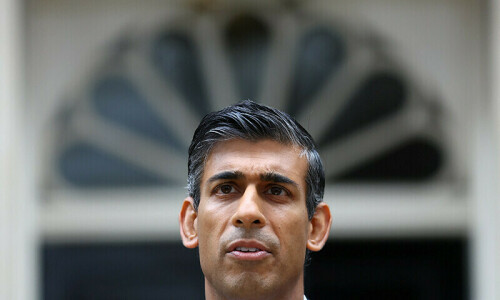Sunak’s rise to PM

RISHI Sunak emerging as Britain’s new prime minister after having lost to Liz Truss in a Conservative Party leadership tussle earlier this year, has led to several discussions on race and religion in British politics. As Britain’s first non-white and Hindu prime minister he is inevitably the subject of world attention.
Parallels have been drawn with Barack Obama, the first non-white American president. Yet there are more differences than similarities. Obama, the son of a largely absent Kenyan father, was raised by a white American mother. Mixed-race Obama could relate equally to whites and blacks, his connection with the latter solidified by his wife, Michelle, whose roots lay firmly in the Black American community. As a lawyer and community organiser, Obama’s rise within the Democratic Party and electoral wins resulting in eight years in office can be attributed to his personal appeal and charisma.
Sunak, on the other hand, is more of “an accidental prime minister”, as Avinash Paliwal recently wrote in The Indian Express. His party rejected him as their leader a few months back precisely because he has little personal appeal and given the Conservative Party’s ethos, his race and religion would make it even harder for the Tories to win a general election under his leadership. Nevertheless, Sunak got his chance because Liz Truss bungled and had to leave after a mere 45 days in office.
And so the anti-immigrant Tory Party is now being led by a son of immigrants from East Africa. Like Obama, Sunak’s father was born in Kenya. But unlike Obama, who made sure to profess his Christian faith, Sunak is a practising Hindu. His wife, Akshata Murty, is an Indian national who does not have British citizenship. As she is also the daughter of a billionaire, not acquiring British nationality has helped her avoid taxes in Britain. Their combined wealth is estimated at $800 million, making them richer than King Charles.
Sunak is more of an ‘accidental prime minister’
None of this makes Sunak more acceptable to the racists however, as a caller on an LBC podcast clip that recently went viral on social media amply demonstrated. Jerry, the caller, a Conservative Party member who supports Boris, lamented that “nobody would make me prime minister of Pakistan or Saudi Arabia”, so why should someone as different as Rishi Sunak be allowed to run Britain?
The podcast host, Sangita Myska, insisted that Sunak was born in Britain and had every right to be prime minister. But Jerry disagreed and said it doesn’t matter where you’re born. He went on to give the example of his mate, who was born in Uganda, but was as English as he was and served in the military with him. Sangita then confronted Jerry about his idea of patriotism being reserved for whites only, which Jerry did not dispute.
Surely the likes of Jerry exist everywhere, and in the US, they fuelled the xenophobic Make America Great Again movement that Donald Trump led after the resentment that brewed in those quarters following two terms of Barack Obama.
But guess what? Jerry and others like him are fighting a losing battle. Immigration has played a key role in developing Western economies. The more recent an immigrant the harder s/he works. Despite calls to limit immigration to ‘the tens of thousands’ from the right wing, it is simply not feasible for any government because businesses rely on immigrant workers to function. The UK needs workers in the hundreds of thousands from abroad.
Naturally immigration leads to demographic changes. And the beauty of a democracy is that it allows representation. Although Sunak may have no real constituency to turn to in a general election, there will be many more children of immigrants who will represent their constituencies and rise to the highest echelons of power.
Justin Trudeau’s cabinet in Canada already has both Muslims and Sikhs. In Britain, Sajid Javed, the son of Pakistani immigrants, has served as home secretary and chancellor of the exchequer, while Sadiq Khan has been mayor of London since 2016. Rachida Dati, daughter of Muslim immigrants from North Africa, served as justice minister in France. Ahmad Aboutaleb, who grew up as the son of the mosque’s imam in a small village in Morocco and moved to Netherlands when he was 15, presently serves as the mayor of Rotterdam.
In Europe, far more than in America, demographic changes have meant that Muslims, in particular, will find it easier to run for political office. In Brussels, for instance, 25 per cent of the population is Muslim. In certain parts of France, like Saint-Denis, the percentage is as high as 45pc. In London, it’s 14pc but in Bradford it’s 25pc.
Surely, these demographic changes will not appeal to some and there may well be more xenophobic exchanges, but in the long run it’s a win for immigrants.
The writer is a lawyer who lives in London.
Twitter: @ayeshaijazkhan
Published in Dawn, October 29th, 2022












































